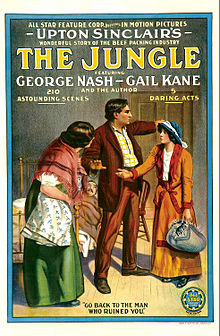
The Federal Meat Inspection Act of 1906 (FMIA) is an American law that makes it illegal to adulterate or misbrand meat and meat products being sold as food, and ensures that meat and meat products are slaughtered and processed under strictly regulated sanitary conditions. These requirements also apply to imported meat products, which must be inspected under equivalent foreign standards. United States Department of Agriculture (USDA) inspection of poultry was added by the Poultry Products Inspection Act of 1957 (PPIA). The Food, Drug, and Cosmetic Act authorizes the Food and Drug Administration (FDA) to provide inspection services for all livestock and poultry species not listed in the FMIA or PPIA, including venison and buffalo. The Agricultural Marketing Act authorizes the USDA to offer voluntary, fee-for-service inspection services for these same species.
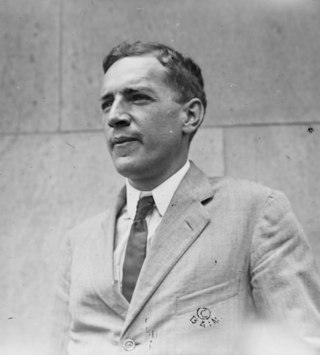
Upton Beall Sinclair Jr. was an American writer, muckraker, political activist and the 1934 Democratic Party nominee for governor of California who wrote nearly 100 books and other works in several genres. Sinclair's work was well known and popular in the first half of the 20th century, and he won the Pulitzer Prize for Fiction in 1943.
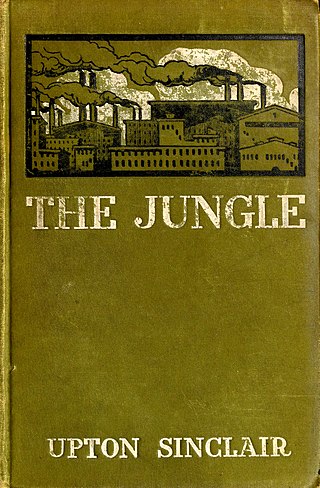
The Jungle is a fictional novel by American muckraker author Upton Sinclair, known for his efforts to expose corruption in government and business in the early 20th century. In 1904 Sinclair spent seven weeks gathering information while working incognito in the meatpacking plants of the Chicago stockyards for the socialist newspaper Appeal to Reason, which published the novel in serial form in 1905. The novel was later published in book format by Doubleday in 1906.

George Foreman vs. Muhammad Ali, billed as The Rumble in the Jungle, was a heavyweight championship boxing match on October 30, 1974, at the 20th of May Stadium in Kinshasa, Zaire, between undefeated and undisputed heavyweight champion George Foreman and Muhammad Ali. The event had an attendance of 60,000 people and was one of the most watched televised events at the time. Ali won by knockout in the eighth round.

End Poverty in California (EPIC) was a political campaign started in 1934 by socialist writer Upton Sinclair. The movement formed the basis for Sinclair's campaign for Governor of California in 1934. The plan called for a massive public works program, sweeping tax reform, and guaranteed pensions. It gained major popular support, with thousands joining End Poverty Leagues across the state. EPIC never came to fruition due to Sinclair's defeat in the 1934 election, but is seen as an influence on New Deal programs enacted by President Franklin D. Roosevelt.

The meat-packing industry handles the slaughtering, processing, packaging, and distribution of meat from animals such as cattle, pigs, sheep and other livestock. Poultry is generally not included. This greater part of the entire meat industry is primarily focused on producing meat for human consumption, but it also yields a variety of by-products including hides, dried blood, protein meals such as meat & bone meal, and, through the process of rendering, fats.
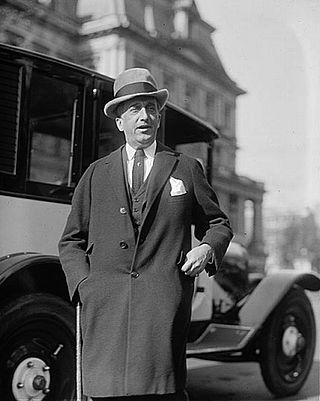
Jonathan Ogden Armour was an American meatpacking magnate and only surviving son of Civil War–era industrialist Philip Danforth Armour. He became owner and president of Armour & Company upon the death of his father in 1901. During his tenure as president, Armour and Co. expanded nationwide and overseas, growing from a mid-sized regional meatpacker to the largest food products company in the United States.

The Union Stock Yard & Transit Co., or The Yards, was the meatpacking district in Chicago for more than a century, starting in 1865. The district was operated by a group of railroad companies that acquired marshland and turned it into a centralized processing area. By the 1890s, the railroad capital behind the Union Stockyards was Vanderbilt money. The Union Stockyards operated in the New City community area for 106 years, helping Chicago become known as the "hog butcher for the world," the center of the American meatpacking industry for decades. The yards became inspiration for literature and social reform.

Charles Edward Russell was an American journalist, opinion columnist, newspaper editor, and political activist. The author of a number of books of biography and social commentary, he won the 1928 Pulitzer Prize for Biography or Autobiography for The American Orchestra and Theodore Thomas.
Christopher Phelps is an American political and intellectual historian of the twentieth century. The subjects of his research and writing include philosophical pragmatism, class and labor in social thought, the American Left, and race and sexuality in American history. He teaches in the department of American and Canadian Studies at the University of Nottingham in England.

Go West is a 1925 American silent Western comedy film directed by and starring Buster Keaton.

Gail Kane was an American stage and silent movie actress.

The Appeal to Reason was a weekly left-wing political newspaper published in the American Midwest from 1895 until 1922. The paper was known for its politics, lending support over the years to the Farmers' Alliance and People's Party before becoming a mainstay of the Socialist Party of America, following that organization's establishment in 1901. Making use of a network of highly motivated volunteers known as the "Appeal Army" to spur subscription sales, paid circulation of the Appeal climbed to more than a quarter-million copies by 1906 and half a million by 1910, making it the largest-circulation socialist newspaper in American history.
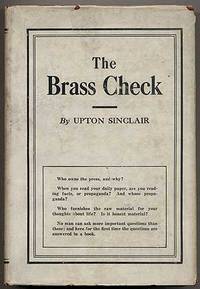
The Brass Check is a muckraking exposé of American journalism by Upton Sinclair published in 1919. It focuses mainly on newspapers and the Associated Press wire service, along with a few magazines. Other critiques of the press had appeared, but Sinclair reached a wider audience with his personal fame and lively, provocative writing style. Among those critiqued was William Randolph Hearst, who made routine use of yellow journalism in his widespread newspaper and magazine business.
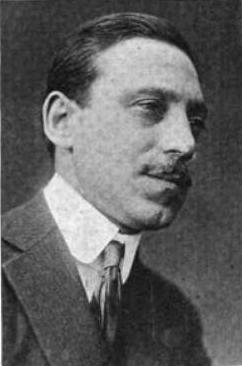
Daniel Carson Goodman was an American screenwriter and licensed physician.

The 1934 California gubernatorial election was held on November 6, 1934. Held in the midst of the Great Depression, the 1934 election was amongst the most controversial in the state's political history, pitting conservative Republican Frank Merriam against former Socialist Party member turned Democrat Upton Sinclair, author of The Jungle. A strong third party challenge came from Progressive Raymond L. Haight, a Los Angeles lawyer campaigning for the political center. Much of the campaign's emphasis was directed at Sinclair's EPIC movement, proposing interventionist reforms to cure the state's ailing economy. Merriam, who had recently assumed the governorship following the death of James Rolph, characterized Sinclair's proposal as a step towards communism.

Benjamin Hanford was an American socialist politician during the late 19th and early 20th centuries. A printer by trade, Hanford is best remembered for his 1904 and 1908 runs for Vice President of the United States on the ticket of the Socialist Party of America, running next to Presidential nominee Eugene V. Debs. Hanford was also the creator of the fictional character "Jimmie Higgins," a prototypical Socialist rank-and-filer whose silent work on the unglamorous tasks needed by any political organization made the group's achievements possible — a character later reprised in a novel by Upton Sinclair.
Jurgis and Jurģis are male given names. They are cognates of George. They may refer to:
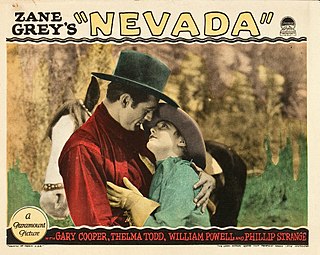
Nevada is a 1927 American silent Western film directed by John Waters and starring Gary Cooper, Thelma Todd, and William Powell. Based on the novel Nevada by Zane Grey, the film is about a former outlaw hired to protect a ranch owner's daughter, which angers the ranch foreman who is in love with the girl. The villainous foreman spreads a rumor of his rival's dark past to the sheriff, and the former outlaw is soon on the run again. Eventually he captures a gang of cattle rustlers led by the foreman, and with his reputation restored, he marries the girl. This lavish Western film was remade in 1944 as a B movie version titled Nevada starring Robert Mitchum—the only time Cooper and Mitchum played the same role; the remake was so early in Mitchum's career that he was billed with "Introducing Bob Mitchum as Jim Lacy."
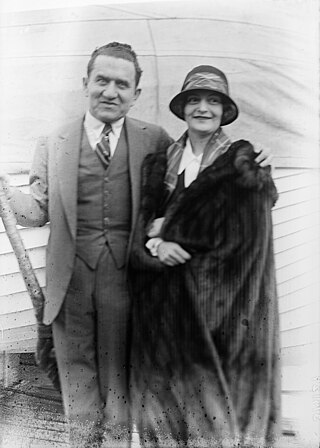
Archibald Selwyn was a Canadian-American play broker, theater owner and stage producer who had many Broadway successes. He and his brother Edgar Selwyn were partners. They were among the founders of Goldwyn Pictures, later to be merged into MGM.
